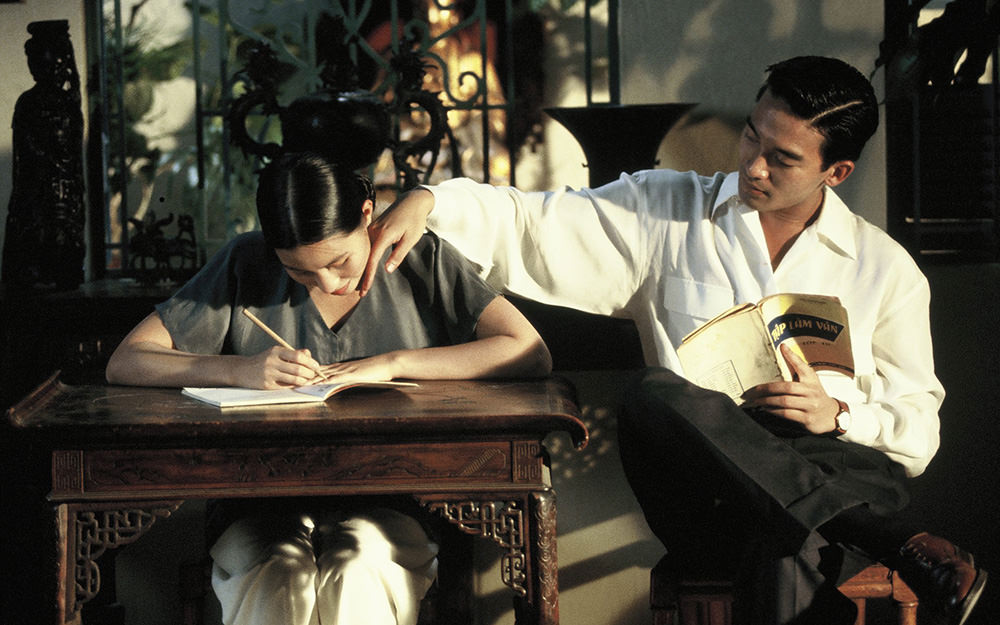The Scent of Green Papaya by Tran Anh Hung (Review)

It’s a pretty well-established fact that people’s attention spans are getting shorter and shorter. And it’s pretty safe to say that much of this is reflected (and perpetuated) by the media that surrounds us. We demand that the information we receive be condensed to its barest of essentials, packaged in an easy-to-assimilate form, and sent quickly and efficiently. Otherwise, we completely dismiss it because our attention has been grabbed by something more interesting and easy to grasp. It’s ironic that I’m writing this on a website, because the Web is the perfect example of this media phenomona. If a site doesn’t load quickly, provide us with the information we seek after a couple of clicks, or takes to long to read, we quickly move on to the next site.
Taking such an approach when it comes to watching The Scent of Green Papaya would be at best frustrating, and at worst disasterous. The movie is the cinematic equivalent of a lazy summer day; it slowly unfolds and envelopes you in its atmosphere, it’s unhurried and unconcerned with quickly revealing itself. Instead, The Scent of Green Papaya is more concerned with drawing you in, making you notice the wonders behind seemingly trivial events and details.
On the surface, the film concerns a young girl named Mui who arrives as a new servant to a Vietnamese household in 1950s Saigon. Although she’s the main character, the film doesn’t so much focus on her as on her new household. Through a series of seemingly random slices of life — the obnoxious son who always undoes Mui’s work, the mother who sees Mui as her dead daughter, the father who abandons his family for other women — we find out just as much about the lives the characters lead as if they each gave monologues.
Through Mui, we watch the trivial details of everyday life in the house, the daily rituals and routines that drive the house. However, we also discover the wonder behind some of these rituals. Throughout the film, Mui is often captivated by the world around her, and through her, we become captivated as well. It may be something as trivial as papaya juice dripping onto a leaf, but her reaction, and the way it is handled by the camera, turns it into a meditative moment.
The movie then flashes forward 10 years. Mui is a now a beautiful young woman, but she is still much the same. The family she serves has fallen on hard times, and so she is sent to live with a family friend, a young composer. As with the first part of the movie, Mui slowly acclimates herself to this new household. The young man she lives with slowly becomes enamored with her, and as the movie ends, a love affair between the two emerges.
Although much of what I’d read about The Scent of Green Papaya threw about words like “erotic” and “sexual awakening,” I feel such words are innacurate. Although the last few scenes in the movie could be labelled as such, it is handled quite tastefully and the growing sexuality of Mui is never trivialized or used for mere titillation. If anything is sensual about the movie, it is the visuals and use of sound.
Although the movie was filmed on a soundstage, you would never be able to tell. The camera is never empty, nor is it ever filled with artificial-looking objects. The camera is always occupied by lush flora, the wide open spaces of the house where Mui lives, the small details that flow through ordinary events and everyday life. Acting-wise, don’t expect any “traditional” tour-de-forces. The movie is not about great acting, but about presenting the ordinary details of life. As such, the acting is wonderful, because they are not required to be anything more than normal people. Both actresses who portray Mui are simply radiant, especially Man San Lu, who portrays Mui as a young child. Her face is absolutely angelic when she focuses on the antics of the animals who surround her, or when she develops a crush on a young man visiting the house (the same man she later goes on to serve) and serves him dinner. It’s the little things like this that make this movie work.
The use of sound is especially important, since a majority of the movie contains no dialog. Because the characters speak so little, it is up to the sounds of the world that surrounds them to speak, to describe what goes on. It could be the chirping of crickets, the rhythmic sounds of a prayer drum, the music that flows throughout the house, or a simple rainstorm. Like the visuals, it describes a lush, exotic world where words don’t always need to be said in order to feel what’s going on.
I know many people who would watch this movie and say that nothing happens, or who would be easily bored by it. And I can completely understand why. However, whatever people might consider to the film’s weaknesses are, in reality, its strengths. The Scent of Green Papaya concerns itself with being realistic, with finding the beauty in the ordinary. Therefore, it is not easily compacted and presentable. It requires more than just a soundbite to describe the beauty of a rainstorm, or show how beautiful sap dripping onto a leaf can be, or watch a young girl grow up to become a radiant woman. Thankfully, this is not the approach The Scent of Green Papaya takes.
